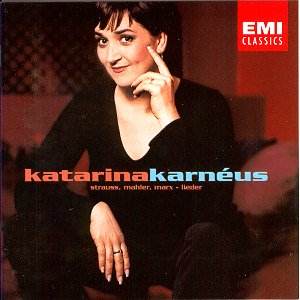EMI Debut Katarina Karnéus
Richard STRAUSS
Die Nacht, op. 10/3, Meinem Kinde, op. 37/3, Begegnung, Nachtgang, op.
29/3, Ruhe, meine Seele! Op. 27/1, Allerseelen, op. 10/8, Mein Herz ist stumm,
op. 19/6, Morgen! Op. 27/4, Wie solten wir geheim sie halten, op. 19/4
Gustav MAHLER
Frühlingsmorgen, Ich ging mit Lust durch einen grünen Wald,
Ablösung im Sommer, Erinnerung, Hans und Grethe, Scheiden und Meiden,
Rückert-Lieder: Ich atmet' einen linden Duft, Blicke mir nicht in
die Lieder, Liebst du um Schönheit, Ich bin der Welt abhanden
gekommen
Joseph MARX
Und gestern hat er mir Rosen gebrach, Maienblüten, Hat dich die Liebe
berüht, Wofür, Venetianisches Wiegenlied
 Katarina Karnéus
(mezzo-soprano), Roger Vignoles (pianoforte)
Katarina Karnéus
(mezzo-soprano), Roger Vignoles (pianoforte)
Recorded 7/1998 at St. Michael's Church, Highgate, London
 EMI CLASSICS CDZ 5 73168
2 [64.55]
EMI CLASSICS CDZ 5 73168
2 [64.55]
Crotchet
£4.50
AmazonUK
£6.99 AmazonUS
Amazon
recommendations

This is the second singer in EMI's "Debut" series to come my way this month
(see)and this time, too, I am happy to report that
we get full texts with translations into English and French, together with
trilingual notes. What's more, they're in black print on white paper, which
may sound obvious to you and me but it doesn't to the people at EMI, I can
assure you.
My other record featured a singer, Nathan Gunn, who, aside from the "debut"
aspect, seemed a fully-formed, mature artist. Katarina Karnéus has
a very interesting voice, but here I feel there is still work to be done.
In her introduction she mentions that many "think that Richard Strauss's
songs are best suited to a soprano voice" and hopes that her choice "will
show that this doesn't necessarily have to be the case". Well yes, because
hers is a rather special type of mezzo-soprano voice. I confess to having
a virtually infallible sense of pitch and I almost always know immediately
a song starts which key it is being sung in. Now there must be something
in the range of harmonics which Karnéus's voice possesses which completely
threw me. Time and again I went to the piano and found she was singing in
a lower key than I thought. So in fact what we hear is the sort of creamy,
golden-toned "soprano" voice which we usually associate with Strauss. (And
thus no proof of how the songs would sound with a "normal" darker-toned mezzo).
Having admitted that this voice is a very lovely instrument, I must say that
its use has not quite settled down yet. Take the point near the end of the
first song, "Der Nacht", where she sings a number of Cs (an octave above
middle C) to the words "Seele" and "Nacht". Where she gives a little more
tone the sound is full and strong. But other times she seems to be holding
back and the sound is a little husky, off-the-voice. Her higher range (for
a mezzo - I mean around E and F above this last-mentioned C) tends to come
out school-girlishly pure (the "pure white", or "Nymphs and Shepherds style",
as Anna Russell put it). Take the first of the Mahler songs,
"Frühlingsmorgen" and listen as she sings "Zweigen" in the second line.
But then hear her sing "Sonn'" towards the end and she lets the voice expand,
its quality supported by a natural vibrato. But this quality has to be kept
in piano, singing off the voice is not the answer.
Then, is she a mezzo? It's true that in "Ich ging mit lust" we get
a low G, albeit a small one, but generally by the time she reaches middle
C she is going into her chest resonance and forays any lower are rare (she
begins "Ich bin der Welt" from a B flat, and it's a bit weak). It's also
true that her high B flat "Hans und Grethe" is done en passant so
we do not know whether she could sustain it longer, but on the whole I have
the idea that this voice is more likely to develop upwards than downwards.
Interpretatively, too, she seems unwilling to let herself go. Much of the
Strauss is resolved with a stream of lovely sound which is pleasurable up
to a point ("Ruhe, meine Seele!" gives a hint that she has her more dramatic
side when she wants to) but Mahler loses much of his sting, with the
Rückert-Lieder very placid indeed. In this, Roger Vignoles seems at
one with her, and he is also recorded very backwardly. I think that actually
he did a wonderful job balancing the note-full accompaniments to a not very
large voice, but the producer, unaware that anybody can still do that today,
"brought the voice forward" just the same.
I haven't mentioned the Marx yet, and right from the first I found Karnéus
finally unfettered, really showing what she can do. The songs are highly
attractive so this part of the recital makes a fine visiting-card for her.
I'm sorry if I have to say that the rest seems more a report on "work in
progress", but those who want to follow from the start a career which offers
much promise, and to collect some lovely Marx songs at the same time, should
dip in.
Christopher Howell

